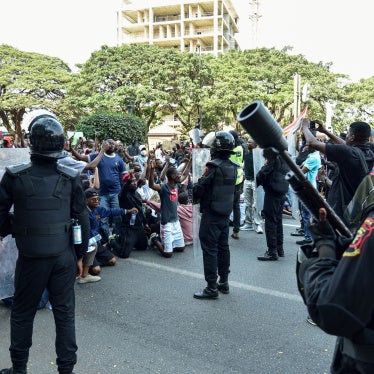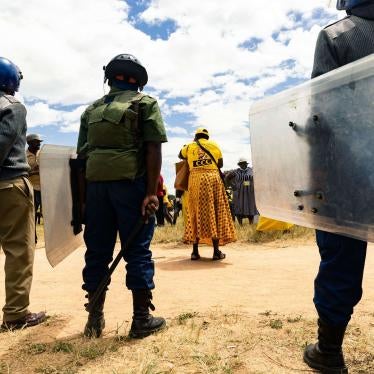The interference by the military and other security forces in Zimbabwe's political and electoral affairs - in support of President Robert Mugabe and his political party ZANU-PF – remains a problem, says campaigner
When a new constitution for Zimbabwe was signed into law at the end of last month, millions of Zimbabweans and many observers abroad welcomed the progress toward democratic elections expected by end of October. A peaceful referendum on the constitution in March gave much needed hope that Zimbabwe had turned the corner and made a clean break with its ugly past of violent elections.
There are high expectations for a democratically elected government that would address the country's longstanding serious human rights issues. But as things stand the chances of free, fair and credible elections remain slim - in the absence of a security sector and other essential reforms.
Our report The elephant in the room: reforming Zimbabwe's security sector ahead of elections documents the interference by the military and other security forces in Zimbabwe's political and electoral affairs - in support of President Robert Mugabe and his political party ZANU-PF. They have prevented Zimbabweans from exercising their rights to freedom of expression and association and to vote.
Since a 'unity government' was created in February 2009, several senior military officials have publicly expressed support for Mugabe and ZANU-PF and denigrated Prime Minister Morgan Tsvangirai - the leader of the opposition Movement for Democratic Change. On May 1, Police Commissioner General Augustine Chihuri publicly said that the security forces would never meet with Tsvangirai to discuss security reforms and that anyone who reported on or raised the issue risked arrest.
Then on May 4, the Zimbabwe Defence Forces commander General Constantine Chiwenga similarly told the state-run weekly The Sunday Mail that he would not meet with Tsvangirai to discuss security reforms. "We have no time to meet sellouts," he said. "Clearly Tsvangirai is a psychiatric patient who needs a competent psychiatrist."
These statements go beyond mere rhetoric. Two journalists who reported on an alleged meeting between Tsvangirai and the heads of the security forces were arrested in May. And soldiers deployed across the country have intimidated people, committed beatings and other abuses against perceived supporters of the MDC and government critics. At times these soldiers have used food distribution, community school projects and even an 'army history research project' to gain entry into various communities.
The security forces' brazen support of ZANU-PF has been endorsed by the party's leaders. For instance, ZANU-PF spokesperson Rugare Gumbo told us last month that no one should expect Zimbabwe's security forces to be non-partisan and politically neutral because of their history of the liberation struggle against colonial rule.
Although the new constitution, as well as various laws, require neutrality and impartiality from the security forces no effort has been made to enforce them. No members of the security forces are known to have been disciplined or prosecuted for acting in a partisan manner or committing criminal offenses against the MDC and its supporters.
The international community cannot afford to ignore the security forces' partisan stance or the government's failure to take disciplinary action against those responsible for making incendiary statements. During the 2008 elections, the armed forces committed widespread abuses including killings, beatings and torture against MDC supporters and members.
Zimbabwe's unity government, with support from the Southern African Development Community and the African Union, should urgently take steps to ensure the political neutrality of the security forces. The government should investigate and prosecute alleged abuses by security force personnel. It needs to publicly direct the security force leaders to carry out their responsibilities in a professional and impartial manner, appropriately punishing or prosecuting those who fail to do so.
The European Union and the wider international community should also press for reforms to the security forces and other urgent reforms needed to increase the likelihood of credible, free and fair elections. These include changes to ensure the independence and professional capacity of the Zimbabwe Electoral Commission and a cleaned-up - and up-to-date - voter's register under the commission's exclusive control.
Independent groups, including human rights organisations, should be able to freely conduct voter education across the country. State media should give equal access to all political parties without bias or favour and laws infringing on the right to freedom of expression should be amended or revoked. The government of Zimbabwe says it has no money to fund the coming elections and has approached SADC and other donors for election funds.
Donors contributing funds should insist on conditions for free and fair elections. Ignoring security and other reforms and rushing headlong toward elections would only prolong the country's longstanding human rights and governance crisis and dash Zimbabwean's long-held hopes of a return to normalcy under a conducive electoral environment.
Dewa Mavhinga is senior researcher for Zimbabwe and Southern Africa at Human Rights Watch








